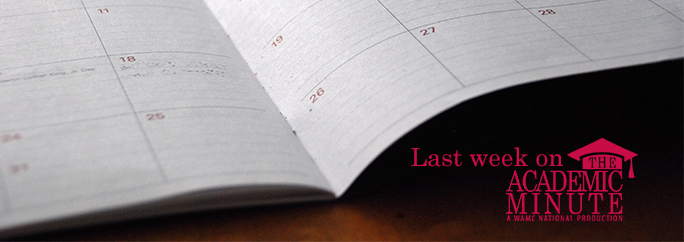The Academic Minute for 2020.12.21-2020.12.25

The Academic Minute from 12.21 – 12.25
Monday, December 21st
Rosalyn LaPier – University of Montana
Solstice
Rosalyn is an award winning Indigenous writer, ethnobotanist and environmental activist with a BA in physics and a PhD in environmental history. She works to revitalize Indigenous & traditional ecological knowledge (TEK), to address environmental justice & the climate crisis within Indigenous communities, and to strengthen public policy for Indigenous languages. Dr. LaPier is an enrolled member of the Blackfeet Tribe of Montana and Métis.
Tuesday, December 22nd
Mark Canada – Indiana University Kokomo
Poe In His Right Mind
Mark Canada, Ph.D., is Executive Vice Chancellor for Academic Affairs and Professor of English at Indiana University Kokomo. A longtime champion of student success, he was a leading participant in the national Re-Imagining the First Year project, sponsored by the American Association of State Colleges and Universities. At IU Kokomo, he leads the KEY, an experiential-learning initiative that provides all students with opportunities to learn through internships, retreats, research, community projects, and educational trips to businesses, museums, and natural and historic settings in Chicago, Louisville, Detroit, New York, Yellowstone National Park, Disney World, Silicon Valley, and other destinations. A professor of American literature, he spent many years in the classroom at the University of North Carolina at Pembroke, where he was a recipient of the University of North Carolina Board of Governors Award for Excellence in Teaching. His six books include Edgar Allan Poe: Master of Horror (forthcoming from Audible), Thomas Wolfe Remembered (University of Alabama Press, 2018), Introduction to Information Literacy for Students (Wiley, 2017), and Literature and Journalism in Antebellum America (Palgrave Macmillan, 2011). His articles on student success, truth in the media, Henry David Thoreau, Rebecca Harding Davis, Theodore Dreiser, Edgar Allan Poe, and other subjects have appeared in The Chronicle of Higher Education, Change, The Academic Minute, The Conversation, Southern Cultures, American Literary Realism, Edgar Allan Poe in Context, and other outlets.
Wednesday, December 23rd
Jennfier Zelnick – Touro Graduate School of Social Work
Managerialism
Jennifer Zelnick, Professor & Social Welfare Policy Chair at the Touro College Graduate School of Social Work, holds a master’s degree in social work, and a doctorate in public health, and conducts research in the U.S. and South Africa.Dr. Zelnick is a public health social worker committed to bringing social work skills into public health research and services. Her research and scholarship investigate topics of importance to the health and social service workplace, beginning with the premise that quality health/social services and successful outcomes depend on sustainable work environments. She is trained in community organizing and occupational health and safety policy. Her research is geared towards useful input into policy development.
Thursday, December 24th
Alex Frano – University of California San Diego
Neuromorphic Computers
Alex Frañó is Assistant Professor at the University of California, San Diego. He obtained his Bachelor’s degree in Physics from the National University of Honduras in Tegucigalpa. Then, after playing in an alternative rock band in Mexico City and other places, he returned to Physics to work on his Master’s degree at the University of Stuttgart. He did his PhD research with Prof. Bernhard Keimer the Max Planck Institute for Solid State Research stationed at the synchrotron facility in Berlin. He won the Ernst-Eckhard-Koch Prize and the Springer Outstanding PhD Research Prize. He was later awarded the University of California (UC) Presidential Postdoctoral Fellowship to work at UC Berkeley with emeritus Chancellor Robert Birgeneau. Now he is an Assistant Professor and he has recently won the Sloan Research Award 2020. He is also the Assistant Director of an “Energy Frontier Research Center” funded by the Department of Energy to study “Quantum Materials for Energy Efficient Neuromorphic Computing”; with the goal of developing a new materials’ platform for a computing paradigm inspired by the brain. His other research interests include strongly correlated electron systems, design and growth of transition-metal oxide heterostructures, and various forms of x-ray scattering tools to probe their properties.
Friday, December 25th
Jose Holgiun-Veras – Rensselaer Polytechnic Institute
Package Delivery Emissions
Dr. José Holguín-Veras is the William H. Hart Professor, and Director of the Center for Infrastructure, Transportation, and the Environment; and the Volvo Research and Educational Foundations (VREF) Center of Excellence on Sustainable Urban Freight Systems at the Rensselaer Polytechnic Institute. He received his B.Sc. in Civil Engineering, Magna Cum Laude, from the Universidad Autónoma de Santo Domingo, Dominican Republic, in 1981; his M.Sc. from the Universidad Central de Venezuela in 1984; and his Ph.D. from The University of Texas at Austin in 1996. He has been a faculty at California Polytechnic State University at San Luis Obispo, City College of New York (1997-2002), and Rensselaer Polytechnic Institute (2002-present). His work has received numerous awards, including the 2013 White House Champion of Change Award for his contributions to freight transportation and disaster response. His research emphasizes the integration, synthesis, and projection of the knowledge that exist in multiple disciplines to produce solutions to the complex and multifaceted problems—which have proven to be too complex to be solved by single-disciplinary approaches—that impact freight transportation and humanitarian logistics. His research taps into the knowledge of social sciences to build more realistic mathematical models of humanitarian logistics, and integrate cutting edge economic principles into freight transportation modeling, so that a complete picture could be developed on the broader impacts of transportation activity on the economy and the environment; and on the most effective ways to conduct post-disaster humanitarian logistics. His research blends field research and measurements, applied and basic research to ensure that theory relates to reality; and, ultimately, to a set of actionable policy recommendations that contribute to the betterment of the economy and society.

